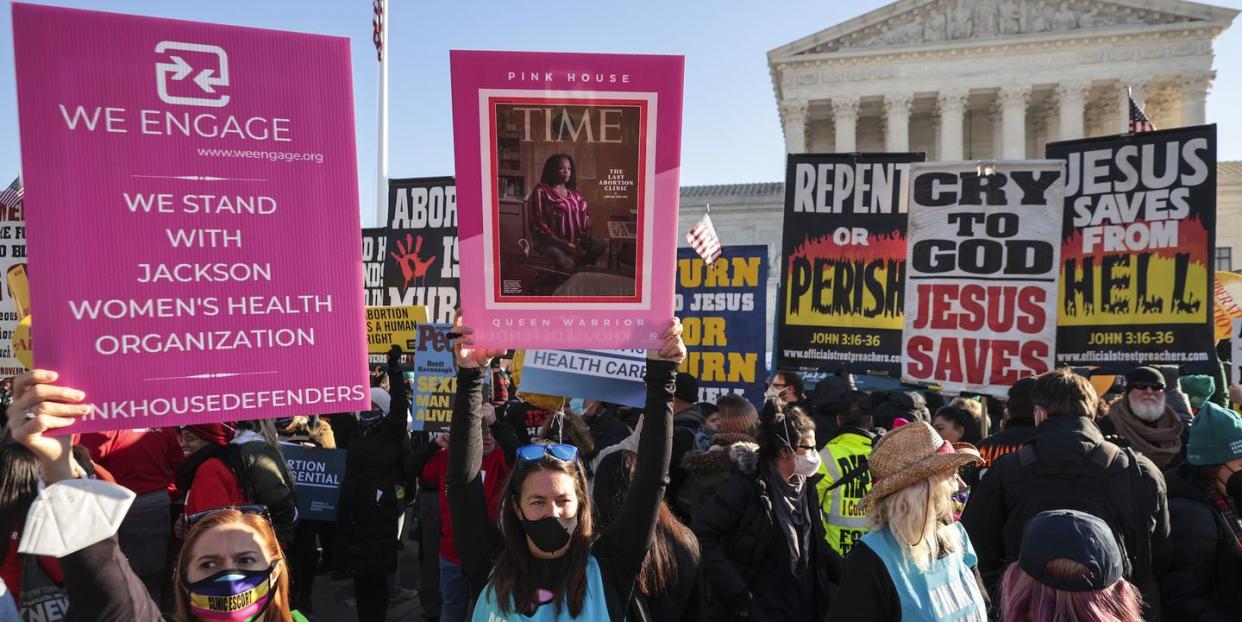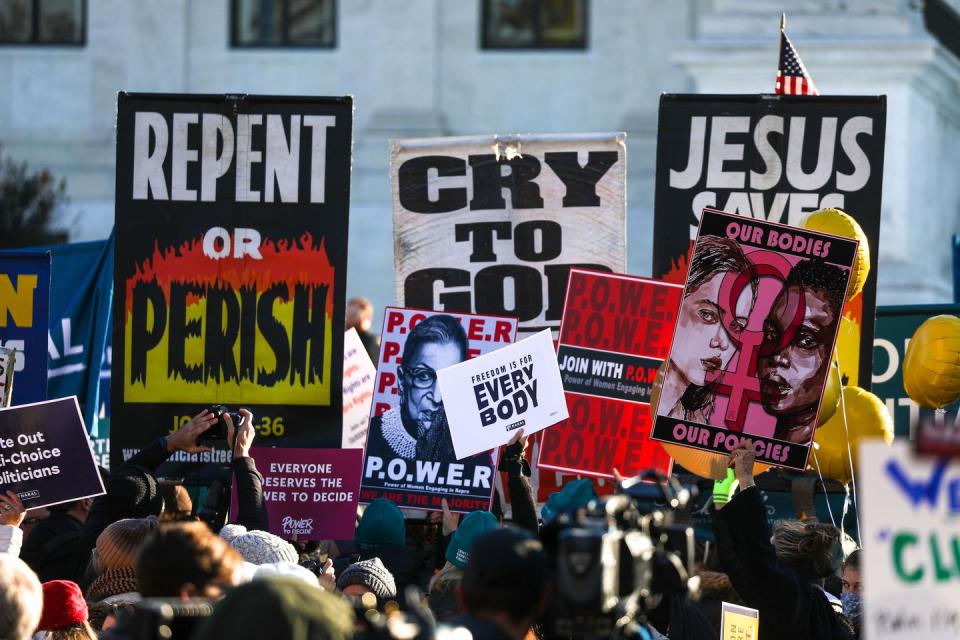Of Course the Supreme Court Is 'Political.' That's Why Conservatives Worked So Hard to Take Control of It.

- Oops!Something went wrong.Please try again later.
- Oops!Something went wrong.Please try again later.
- Oops!Something went wrong.Please try again later.
"Will this institution survive the stench that this creates in the public perception that the Constitution and its reading are just political acts?" Justice Sonia Sotomayor asked the question after pointing to the admission from those who crafted Mississippi's restrictive abortion law that they'd done so with an eye on the current makeup of the Supreme Court—namely, that there's now a 6-3 conservative majority more likely to strike down Roe v. Wade. That could be the outcome of Dobbs v. Jackson Women's Health Organization, the case in which the nation's highest court began hearing oral arguments on Wednesday.
But Sotomayor got at the larger question of whether the Supreme Court will soon have much legitimacy at all as an institution. After all, the man who installed three of those six conservative justices, Donald Trump, campaigned on the promise he would appoint judges who would throw out Roe v. Wade. Along with the Mississippians saying the quiet part out loud, it does not exactly leave you with the impression that the decision that comes down from the Supremes will be arrived at through careful consideration of constitutional precedent. It almost seems kind of political. The conclusion has been decided, in all likelihood. There are just a few details—and the fig-leaf justification—to be worked out. Will Roe be overturned outright, or will it be rendered a hollow shell, or will it undergo death by a thousand cuts?
Justice Brett Kavanaugh got to work on the justification front, or at least on the important task of defending the decision at future dinner parties. "Just to be clear," he asked Mississippi Solicitor General Scott Stewart, "you're not arguing that the Court somehow has the authority itself to prohibit abortion, or that this Court has the ability to order the states to prohibit abortion." This is what Kavanaugh will tell friends in the tony Virginia suburbs: I didn't outlaw abortion, I left it to the states. Considering that 23 states have Republican trifectas—the party controls the governor's mansion and both houses of the state legislature—this case will basically decide whether 23 states can ban abortion. Kavanaugh knows this, but he'd rather go for the Leave It to the States angle.

Meanwhile, in another case before the high court, exactly the opposite seems likely to happen. Justice Samuel Alito, another member of the conservative majority, already signaled during oral arguments in New York State Rifle & Pistol Association v. Bruen that he is ready to strike down a 110-year-old New York gun law. The core question at the heart of that case is whether the individual right to bear arms in the home for self-defense, established under the Second Amendment in a decision written by Justice Antonin Scalia in 2008, also extends outside the home, which would make New York's restrictive concealed-carry law unconstitutional. But Alito's questioning took the right to self-defense outside the home under the Second Amendment as an established premise. That is, he already decided the core question before hearing the case, because he wants to throw out New York's century-old gun policy.
But more to the point here, in the gun case, the Court's conservatives may erase the right of individual states to regulate arms in the public square within their borders—an authority that rests on 700 years of precedent in English and American law. In the abortion case, the conservatives may throw out an established constitutional right in favor of allowing states to make their own policies within their own borders. They could issue these decisions on the same day, in the same week, or at the very least, in the same session. This would see the conservatives throw out a 48-year-old precedent, Roe v. Wade, and expand a 13-year-old precedent, 2008's Heller v. District of Columbia, to arrive at opposite conclusions as to what should be left to states and what is a constitutional right that must be protected against state overreach.
Get unlimited access to all Esquire's politics coverage with Esquire Select.
This is because the Supreme Court is a political body making political decisions. Its members are appointed by politicians with political goals. Sometimes, justices disappoint the presidents—and their political constituencies—that put them on the bench, but it's rare, and especially rare in our time. The increasing salience of these political motivations is threatening the Court's legitimacy, which depends on enough of the public remaining convinced that the Court is merely adjudicating the law, with political consequences as an unavoidable side effect. This is the tune that Justice Stephen Breyer, 83, was singing while engaged in a public campaign to justify his refusal to resign from the Court while his ideological allies control the White House and the Senate. But he seemed to realize there's some partisanship afoot during oral arguments on Wednesday.
The institution's legitimacy comes into peril if the public decides—realizes?—it is a kind of unelected policymaking body. The legitimacy problem goes deeper in this case because three of the conservative justices were appointed by a president who did not win the popular vote. (Two more were appointed by George W. Bush, who lost the popular vote the first time but won it before appointing Justice Samuel Alito and Chief Justice John Roberts.) The three Trump appointed were confirmed by a Senate that did not represent a majority of citizens, or anywhere close. It is a tyranny of the minority, and it's all part of the plan. Because conservatives, unlike Stephen Breyer, have long accepted that the Court is political. That's why they worked so hard to take control of it.
You Might Also Like

